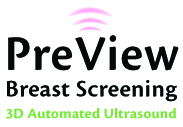Patient Resources

Taking Responsibility for Your Own Breast Health
Most of us can appreciate the importance of earlier detection having been touched by someone with breast cancer. However, many women remain unaware about their own breast density and its potential for delayed cancer detection when using screening mammography alone. Breast density is a key risk factor for 40% of women and should be carefully considered along with other major risk factors when determining which screening procedures and intervals best meet their needs.
Patients and their clinicians now have easier and earlier access to 3D automated breast ultrasound technology as a valuable adjunct to screening mammography, which can accurately and safely screen for breast cancer in dense breast tissue and provide very useful supplemental and comparative structural information over time.
A Key to A Women’s Health and Survival is Early Detection
Preview Breast Screening offers 3D Automated Breast Ultrasound (ABUS) screening to individuals starting as early as in their 20s, allowing for safe and comfortable screening for potential breast tissue changes, especially in dense tissue. ABUS allows for earlier identification, localization, differentiation, sizing and characterization of both lower and higher risk abnormalities, when they are smaller and easier to resolve using less invasive treatments.
ABUS is a SMART Choice for Safe, Gentle, and Accurate Breast Screening For All Women – No Referral Required!
ABUS is available to all individuals, regardless of age, who seek a better understanding of their own breast health, when earlier and easier access to screening are important considerations for monitoring and proactive response to potential concerns. ABUS is safe and gentle for use by younger, pregnant or lactating women or anyone concerned about cumulative radiation exposure and the heavier compression of mammography. It’s also useful for women with a surgical history of breast implants, post-operative or scarred breast tissue. Women can now proactively self-initiate ABUS screening as frequently as needed to supplement their mammography screening in order to optimize monitoring of any breast tissue changes over time.
ABUS is the Latest Technological Advancement in Breast Imaging
ABUS is the latest technological advancement in breast imaging from GE Healthcare. It’s the newest 3D automated ultrasound medical device exclusively developed and designed for breast screening which is FDA and Health Canada approved for use as an adjunct to screening mammography. Although ABUS is most commonly accessed by participants of the Ontario Breast Screening Program (OBSP) with dense breasts seeking added surveillance, it’s also useful for proactive health-conscious women who fall outside the screening mammography guidelines for provincial health insurance coverage for various reasons. For instance, they may be too young or without a proven family history of breast cancer to access routine mammography screening.
ABUS Delivers Exceptional Image Quality for Accurate Interval Comparison
ABUS delivers exceptional 3D image quality using a large automated scanning probe that virtually eliminates operator skill variability associated with handheld ultrasound technology. The system works by positioning a sheer disposable membrane gently on the breast after application of a conductive gel. With three sweeps of the scanning probe over each breast, hundreds of breast tissue image slices are automatically generated of the entire breast in just minutes. The software creates 3D-reconstructed images showing precise anatomical detail of complex breast tissues and structures for the radiologist to review and interpret. This is particularly useful for the radiologist who can now look through hundreds of breast tissue image “slices” back to the chest wall, virtually peeling back the layers of challenging dense breast tissue to visualize cancers, which may have been hidden by dense tissue on a mammogram. ABUS 3D screening software allows for accurate interval comparison of the entire breast area over time, which incidentally is why handheld ultrasound is not approved for screening but rather for diagnostic spot-checking purposes primarily following a suspicious mammogram.
Mammography Alone is Not Enough for Women with Dense Breasts
ABUS is not meant as a replacement of mammography for screening, but rather as an adjunct to help detect and differentiate smaller tumours particularly in women with dense tissue who are at an increased risk for breast cancer. In women with dense tissue, there is an increased risk of undetected cancer lesions when using mammography alone. The detection rate of smaller than 1 cm size cancer lesions is increased 50% by ABUS, to that of mammography alone. Supplementing mammography with ABUS can significantly increase detection rates making treatment programs more successful after having been initiated sooner. Consequently, many women with higher breast density and repeatedly normal (negative) screening mammography findings are choosing ABUS for added surveillance to help minimize the potential for interval cancers being detected between screening exams. Interval cancer rate, sensitivity, and specificity are measures of the diagnostic accuracy of a test. Maintaining a high sensitivity and therefore a low rate of interval cancer is integral to the success of any screening test. A high specificity is also desirable as it reflects the ability of a test to accurately identify cases that are not cancer, therefore reducing the number of false-positive cases. To learn more about the importance of knowing your breast density and the advantages of supplementing mammography screening with ABUS go to (www.densebreastscanada.ca) .





